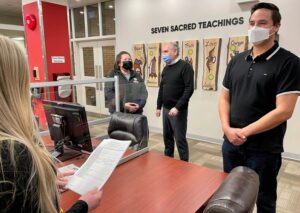Anishinabek Employment and Training Services encourages citizen to complete Labour Market Information Survey

By Rick Garrick
THUNDER BAY — Anishinabek Employment and Training Services (AETS) is conducting a Labour Market Information (LMI) Survey to identify workforce gaps and needs and to better match Northern Superior Region citizens with the right training and jobs.
“AETS is using this LMI survey to get a better demographic of those citizens that are looking for work so we can match that information and put training programs in place that would mitigate the labour shortages,” says John DeGiacomo, executive director at AETS. “As an example, we are just completing some health training programs, one in PSW (personal support worker) and the other in Pre-Health. Confederation College is delivering the training and we have over a dozen students completing at the end of this March 2022 so they will be available to transition into the workplace.”
DeGiacomo says some of the graduating students may also continue with their education in programs such as nursing. Information about the survey is posted online.
“So this way it helps again mitigate some of the demands that are out there right now,” DeGiacomo says.
DeGiacomo says the survey is open to citizens 15-years-old and older from the nine First Nations served by AETS, including Biigtigong Nishnaabeg, Biinjitiwaabik Zaaging Anishinaabek, Michipicoten, Netmizaaggamig Nishnaabeg, Pays Plat, and Red Rock Indian Band.
“We want all citizens to complete the survey whether they are working or not because if they are working, maybe they are underemployed and they want to advance in a different career,” DeGiacomo says. “So either way, we want clients to do the survey, but we also understand that is one half of the circumstance — we also have to take into consideration where employers are at.”
Sharon Ostberg, president at AETS, says gaps in Indigenous education and skills training present both a labour and business problem, with negative impacts on Indigenous individuals, businesses and overall economic growth.
“The lack of information is very concerning and better data is needed to address the problem,” Ostberg says. “Understanding labour market information is essential to identifying industry skills gaps and developing solutions. This LMI survey potentially holds the door open for new Indigenous employees and employers to realize their talent and potential.”
AETS has received approval from each of the nine First Nations for the purpose of collecting data that reflects a community’s overall available workforce including knowledge, skills, and abilities.
“Indigenous unemployment rates continue to be higher than provincial averages, and speaks to the existence of barriers preventing the Indigenous labour force from accessing available job opportunities,” says Melissa Scholz, human resources project co-ordinator for the LMI and Skills Inventory Project at AETS.
“The LMI project explores employment related data from working age Indigenous citizens. Once collected, AETS will be able to analyze the data with each community and use it to improve education to training to employment related programs and services that address the labour market needs.”
DeGiacomo says AETS will also be holding a free virtual improvisational comedy event about Indigenous workplace inclusion featuring Indigenous sketch comedy troupe Tonto’s Nephews on March 24.
“So we’re helping job seeker clients but we’re also helping employers understand what they need to do to be more inclusive in their practices,” DeGiacomo says.
DeGiacomo says the deadline for completing the survey is March 31, noting that survey participants will receive a $10 gift certificate.
“We can do the survey over the phone, we can do it online, we can send somebody a link so they can do it at their home,” DeGiacomo says. “Or we can mail them a copy and they can do a hard [copy] version.”

